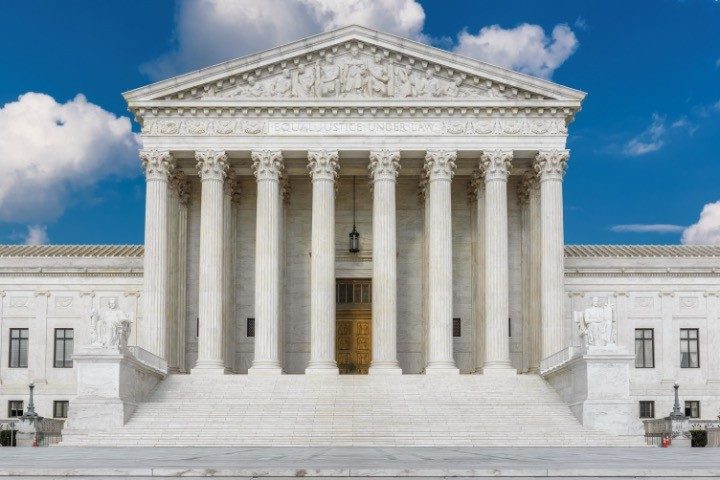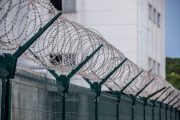
It appears that the ballyhooed “conservative” U.S. Supreme Court isn’t, and that unjustly convicted policeman Derek Chauvin will spend 22 years in prison for doing his job.
SCOTUS turned down Chauvin’s appeal of his conviction for “murdering” career criminal and raging drug addict George Floyd. Chauvin asked the court, which has a solid conservative majority, to review the decision of the Minnesota Court of Appeals to let his unjust conviction stand.
Instead, the court punted. It won’t hear the appeal. And won’t explain why.
One possible reason: The justices feared the riots and burning cities that U.S. Representative Maxine Waters (D-Calif.) promised if Chauvin wasn’t convicted.
The Appeal
On April 20, 2021, a biased, terrified jury convicted Chauvin of murdering Floyd while Chauvin restrained him during an arrest on May 25, 2020. Though Chauvin pinned the sickly Floyd by the back of the neck for nine minutes, the autopsy showed that Floyd, afflicted with Covid-19 and serious cardiovascular disease, died of a fentanyl overdose. The coroner said as much to a prosecutor.
Despite that, the trial proceeded, with Waters promising violence in the streets if the jury delivered the “wrong” verdict. One juror was a Black Lives Matter supporter who lied about attending a Floyd rally, while another feared “rioting and destruction” and “people coming to my house.”
The petition for certiorari, which requests that SCOTUS order a lower court to send it a case for review, focused on the same things as Chauvin’s appeal in Minnesota.
One problem for Chauvin was pretrial publicity, attorney William Mohrman argued.
“News media coverage was relentless and demonized Mr. Chauvin,” the petition avers; and, again, the jurors feared for their lives:
During voir dire examination, jurors testified to their concerns for their own safety, their family’s safety and the safety of their community if they acquitted Mr. Chauvin. One seated juror testified “I do [have concerns for personal safety] for afterwards because I know [my personal identity] would be public information, and it really depends on how the trial—the end results.” … Another seated juror testified to being concerned about the physical safety of friends who worked downtown.… Another testified as being “surprised” and “shocked” by the protestors present for jury selection.… Most troubling, after Juror 27 was seated, Juror 27 learned that his voice had been recognized during voir dire from Court TV. As a result, Juror 27 emailed the trial court requesting to be excused due to concerns for his safety. The trial court refused stating that if it did remove him, the trial court would have to remove all jurors for the same reason.
Potential jurors expressed similar concerns. One expressed concerns about “harm” or “destruction to property” after trial.… Courthouse barricades made one potential juror “anxious,” another raising concerns once seeing the military troops, police, and fencing around the courthouse, which another saw security as reminding him of “Iraq.” … Others were aware of the impact an acquittal would have on their community: “I want to be truthful to myself and not be naïve with if certain outcomes were what it would mean for our country”; concerns about the personal safety and the safety of the city; and “If chaos in the city happened again, would I be safe?”
The judge did not sequester the jury, the petition argued, and refused to change venue even after major riots followed the accidental shooting of black thug Daunte Wright while he resisted arrest. The city settled a wrongful death lawsuit with Floyd’s family for $27 million during his trial.
Oddly, the 38-page petition does not mention that Chauvin did not murder Floyd.
Dershowitz’s Warning
Frighteningly, what leftist legal celebrity Alan Dershowitz said about the jury might well ring true about SCOTUS.
“If you don’t convict on the murder charge, on all the charges, the cities will burn, the country will be destroyed, seeped into the jury room because the judge made a terrible mistake by not sequestering the jury,” Dershowitz said. “So the judge himself said, this case may be reversed on appeal. And I think it might be reversed on appeal. I think it should be reversed on appeal.”
Dershowitz continued:
And when they sit and deliberate, they have to be saying to themselves, consciously or unconsciously, if I were to render a verdict other than a murder verdict, what the consequences will be, for me, and my family, my friends, my business. That should never, ever, be allowed to seep into a jury room. So I have no real confidence that this verdict — which may be correct in some ways — but I have no confidence that this verdict was produced by due process and the rule of law, rather than the influence of the crowd.
Perhaps the conservative majority on the court feared not only major riots and burning cities, but also assassination.
They certainly remember the Floyd riots. And they assuredly recall the would-be assassin who showed up at Associate Justice Brett Kavanaugh’s home — and the pro-aborts who drove him from a Morton’s steakhouse — after the court overturned 1973’s Roe v. Wade decision that struck down every abortion law in the nation to allow the mass murder of the unborn.
Maybe one decision that upsets the radical Left is all they are willing to make.



